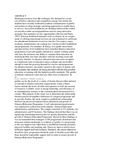The relationship between Perceived quality dimensions And growth in distance Education

View/
Date
18-04-13Author
Peter Nzuki, D
Omondi, Bowa
Gunga
Origa
Type
OtherLanguage
enMetadata
Show full item recordAbstract
Shrinking resources from the exchequer, the demand for a more
cost-effective education and competition among Universities for
students have recently motivated academic administrators in public
universities to adopt strategic marketing approaches to enable them
to survive. Successful institutions are defining market niches within
un-served or under-served populations and are using innovative
strategies that capitalize on new opportunities (Mowen and Parks,
1997). Because traditional strategies such as reliance on on-campus
mode of offering educational services are not in themselves sufficient
for educational institutions to survive into the 21st century, many
academic administrators are creating new visions for their institutions
and programmes. For instance, In Kenya, five public universities
and nine tertiary level institutions have launched distance education
programmes to provide quality education to mature working adults
who have the keenness and ability to continue their education by
studying in their own time and place with far-reaching social and
economic benefits. As distance education becomes more accepted
as a legitimate form of education and as colleges and universities
attempt to meet the growing demand for courses and programmes
for distance learners, one major concern is the aspect of quality and
the assurance that students are being provided with the best possible
education or training with the highest possible standards. The quality
of distance education varies like any other form of education. Its
28
U o N - I S O 9 0 0 1 : 2 0 0 8 C e r t i fi e d
quality can be the result of a variety of factors that are either internal
or external to distance education organizations. Some of these
factors include the levels of skills and expertise of staff, the amount
of resources available, weak or strong leadership, and efficiency of
its administration systems or the communication infrastructure in a
country. The purpose of this study was to determine the relationship
between perceived tangibles dimension of a degree programme and
its growth. Further, the study sought to establish the relationship
between the perceived responsiveness dimension and growth of
Distance Education Programme. A self-administered questionnaire
was employed to collect data from students, Distance Education
administrators and lecturers. The sample consisted of 327 students, two
administrators and 92 lecturers. The findings showed that there was no
significant relationship between the two quality dimensions and the
growth of Distance Education Programme. Based on these findings, it
was recommended that managers of DE programmes should not take
increased student enrolments as evidence of quality of a programme
as this can happen even when there is insufficient learning materials,
physical facilities and teaching aids. However, there is need to have
sufficient support staff and lecturers. Similarly, the course objectives
should be clear, programme should be made as flexible as possible and
there should be responsible support staff in order to ensure growth of
Distance Education Programme
URI
http://distance-education.uonbi.ac.ke/sites/default/files/cees/disteducation/disteducation/CONFERENCE%20BOOKLET.pdfhttp://hdl.handle.net/11295/61211
Citation
The Academic Conference In The School Of Continuing And Distance Education Theme:utilization of open and distance learning In addressing educational challenges in Kenya towards fulfilment of the vision 2030Publisher
University of Nairobi School Of Continuing And Distance Education
